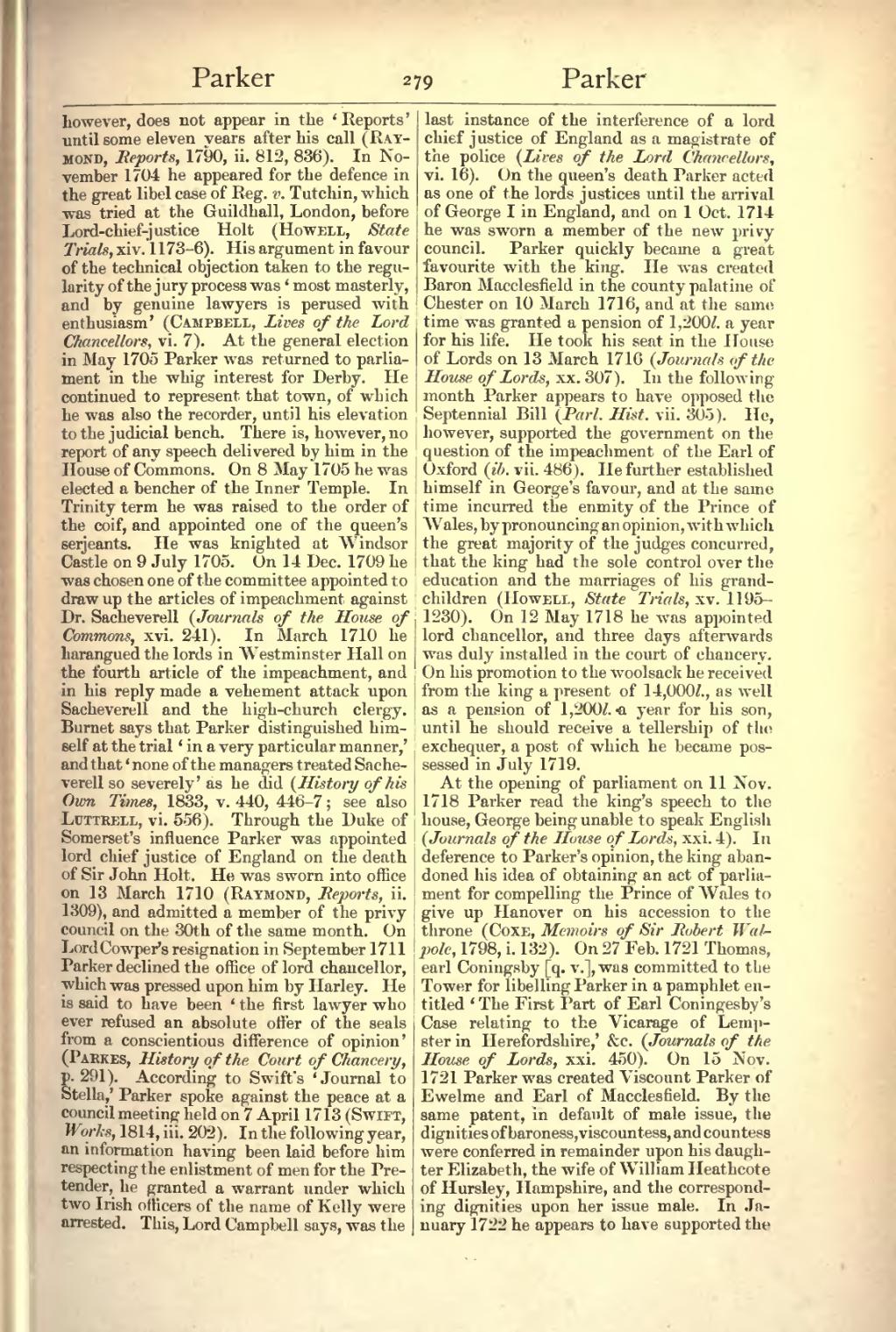however, does not appear in the ‘Reports’ until some eleven years after his call (Raymond, Reports, 1790, ii. 812, 836). In November 1704 he appeared for the defence in the great libel case of Reg. v. Tutchin, which was tried at the Guildhall, London, before Lord-chief-justice Holt (Howell, State Trials, xiv. 1173–6). His argument in favour of the technical objection taken to the regularity of the jury process was ‘most masterly, and by genuine lawyers is perused with enthusiasm’ (Campbell, Lives of the Lord Chancellors, vi. 7). At the general election in May 1705 Parker was returned to parliament in the whig interest for Derby. He continued to represent that town, of which he was also the recorder, until his elevation to the judicial bench. There is, however, no report of any speech delivered by him in the House of Commons. On 8 May 1705 he was elected a bencher of the Inner Temple. In Trinity term he was raised to the order of the coif, and appointed one of the queen's serjeants. He was knighted at Windsor Castle on 9 July 1705. On 14 Dec. 1709 he was chosen one of the committee appointed to draw up the articles of impeachment against Dr. Sacheverell (Journals of the House of Commons, xvi. 241). In March 1710 he harangued the lords in Westminster Hall on the fourth article of the impeachment, and in his reply made a vehement attack upon Sacheverell and the high-church clergy. Burnet says that Parker distinguished himself at the trial ‘in a very particular manner,’ and that ‘none of the managers treated Sacheverell so severely’ as he did (History of his Own Times, 1833, v. 440, 446–7; see also Luttrell, vi. 556). Through the Duke of Somerset's influence Parker was appointed lord chief justice of England on the death of Sir John Holt. He was sworn into office on 13 March 1710 (Raymond, Reports, ii. 1309), and admitted a member of the privy council on the 30th of the same month. On Lord Cowper's resignation in September 1711 Parker declined the office of lord chancellor, which was pressed upon him by Harley. He is said to have been ‘the first lawyer who ever refused an absolute offer of the seals from a conscientious difference of opinion’ (Parkes, History of the Court of Chancery, p. 291). According to Swift's ‘Journal to Stella,’ Parker spoke against the peace at a council meeting held on 7 April 1713 (Swift, Works, 1814, iii. 202). In the following year, an information having been laid before him respecting the enlistment of men for the Pretender, he granted a warrant under which two Irish officers of the name of Kelly were arrested. This, Lord Campbell says, was the last instance of the interference of a lord chief justice of England as a magistrate of the police (Lives of the Lord Chancellors, vi. 16). On the queen's death Parker acted as one of the lords justices until the arrival of George I in England, and on 1 Oct. 1714 he was sworn a member of the new privy council. Parker quickly became a great favourite with the king. He was created Baron Macclesfield in the county palatine of Chester on 10 March 1716, and at the same time was granted a pension of 1,200l. a year for his life. He took his seat in the House of Lords on 13 March 1716 (Journals of the House of Lords, xx. 307). In the following month Parker appears to have opposed the Septennial Bill (Parl. Hist. vii. 305). He, however, supported the government on the question of the impeachment of the Earl of Oxford (ib. vii. 486). He further established himself in George's favour, and at the same time incurred the enmity of the Prince of Wales, by pronouncing an opinion, with which the great majority of the judges concurred, that the king had the sole control over the education and the marriages of his grandchildren (Howell, State Trials, xv. 1195–1230). On 12 May 1718 he was appointed lord chancellor, and three days afterwards was duly installed in the court of chancery. On his promotion to the woolsack he received from the king a present of 14,000l., as well as a pension of 1,200l. a year for his son, until he should receive a tellership of the exchequer, a post of which he became possessed in July 1719.
At the opening of parliament on 11 Nov. 1718 Parker read the king's speech to the house, George being unable to speak English (Journals of the House of Lords, xxi. 4). In deference to Parker's opinion, the king abandoned his idea of obtaining an act of parliament for compelling the Prince of Wales to give up Hanover on his accession to the throne (Coxe, Memoirs of Sir Robert Walpole, 1798, i. 132). On 27 Feb. 1721 Thomas, earl Coningsby [q. v.], was committed to the Tower for libelling Parker in a pamphlet entitled ‘The First Part of Earl Coningesby's Case relating to the Vicarage of Lempster in Herefordshire,’ &c. (Journals of the House of Lords, xxi. 450). On 15 Nov. 1721 Parker was created Viscount Parker of Ewelme and Earl of Macclesfield. By the same patent, in default of male issue, the dignities of baroness, viscountess, and countess were conferred in remainder upon his daughter Elizabeth, the wife of William Heathcote of Hursley, Hampshire, and the corresponding dignities upon her issue male. In January 1722 he appears to have supported the
